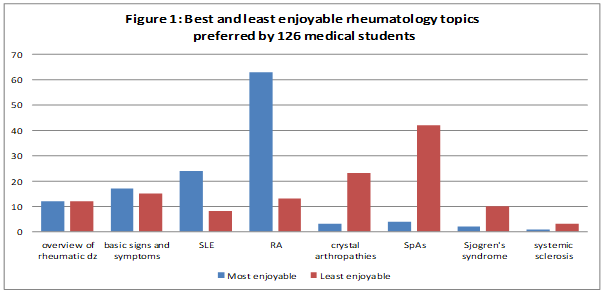Session Information
Date: Sunday, October 21, 2018
Title: Education Poster
Session Type: ACR Poster Session A
Session Time: 9:00AM-11:00AM
Background/Purpose:
There is a disparity between the enormous burden and the knowledge of rheumatic disorders among doctors and this is partly traceable to inadequate undergraduate rheumatology training. The situation is worse in sub-saharan Africa and Nigeria in particular where only 10 out of 30 medical schools teach rheumatology. To bridge the gap, specialist rheumatology residents are increasingly being utilized. Currently, there is no known student-based evaluation of rheumatology teaching effectiveness in Nigeria.
This study aims to identify the most and least enjoyable lectures preferred by the students, the proportion of students able to identify rheumatic conditions after the lectures as well as evaluate rheumatology teaching effectiveness using the augmented Stanford Faculty Development Program Questionnaire (aSFDPQ).
Methods:
All 134 4th to 6th year medical students in the University of Uyo medical School, South-south Nigeria were asked to evaluate their rheumatology lectures using a self-administered questionnaire that included the likert-scale (aSFDPQ) instrument. Each class received about 3 one hour long didactic lectures during their 16-week medicine rotation. Mann whitney U test was used for ordinal data with p<0.05.
Results:
A 94% response rate was obtained from 126 participants. 78 were male (61.9%). 63 students (50%) chose rheumatoid arthritis (RA) as their best topic because it was well explained (52.4%). 42(33.3%) cited spondyloarthropathies (SpAs) as their worst topic because it was difficult(30.1%). Twenty six students (20.6%) identified a rheumatic condition before the lectures compared with 57 (45.2%) after the lectures representing an increase of 24.6% (p=0.001).
The mean aSFDPQ score was 3.76±0.47. Highest scoring domains were: learning climate (4.03) and teacher’s attitude (4.0). The least domain was Evaluation (3.39). Mann Whitney U domain values ranged from (1647.5<U<1869.5), (0.257<p<0.990) with no significant differences by gender (p=0.825) or class (p=0.162). The mean global teacher rating was 74.64±13.65 (range 40-100).
Conclusion:
Rheumatoid arthritis was most enjoyed while spondyloarthritis was least understood by our students. There was a 24.6% increase in the proportion of students able to identify rheumatic conditions after the lectures. Although global teacher rating was good (74.6%), resident teaching effectiveness was suboptimal as assessed by total aSFDPQ score <4.0. There is an urgent need for formal pedagogic training to improve rheumatology teaching effectiveness in Nigeria.
|
|
Table 1: Teaching skill evaluation of Rheumatology Resident |
|
|||||
|
S/N |
|
No. of items |
Mean |
SD |
Minimum |
Maximum |
p value |
|
1 |
Learning climate |
8 |
4.03 |
0.57 |
2.00 |
5.00 |
0.257 |
|
2 |
Control of session |
7 |
3.68 |
0.63 |
1.43 |
5.00 |
0.426 |
|
3 |
Communication of goals |
8 |
3.61 |
0.64 |
1.50 |
5.00 |
0.475 |
|
4 |
Promoting understanding and retention |
8 |
3.87 |
0.63 |
1.38 |
5.00 |
0.988 |
|
5 |
Evaluation |
7 |
3.39 |
0.80 |
1.00 |
5.00 |
0.990 |
|
6 |
Feedback |
7 |
3.57 |
0.69 |
1.00 |
5.00 |
0.372 |
|
7 |
Promoting self-directed learning |
8 |
3.73 |
0.60 |
1.63 |
4.88 |
0.823 |
|
8 |
Teacher’s knowledge |
8 |
3.94 |
0.75 |
1.60 |
5.00 |
0.577 |
|
9 |
Teacher’s attitude |
7 |
4.00 |
0.65 |
1.43 |
5.00 |
0.392 |
|
|
SFDPQ (domains 1-8) |
58 |
3.73 |
0.48 |
1.84 |
4.75 |
0.904 |
|
|
aSFDPQ (all domains) |
65 |
3.76 |
0.47 |
1.79 |
4.78 |
0.825 |
To cite this abstract in AMA style:
Akpabio A, Owolabi M, Umoh V, Adelowo O. Evaluation of Rheumatology Lectures By Clinical Students in a Nigerian Medical School: Learning from the Learners [abstract]. Arthritis Rheumatol. 2018; 70 (suppl 9). https://acrabstracts.org/abstract/evaluation-of-rheumatology-lectures-by-clinical-students-in-a-nigerian-medical-school-learning-from-the-learners/. Accessed .« Back to 2018 ACR/ARHP Annual Meeting
ACR Meeting Abstracts - https://acrabstracts.org/abstract/evaluation-of-rheumatology-lectures-by-clinical-students-in-a-nigerian-medical-school-learning-from-the-learners/

